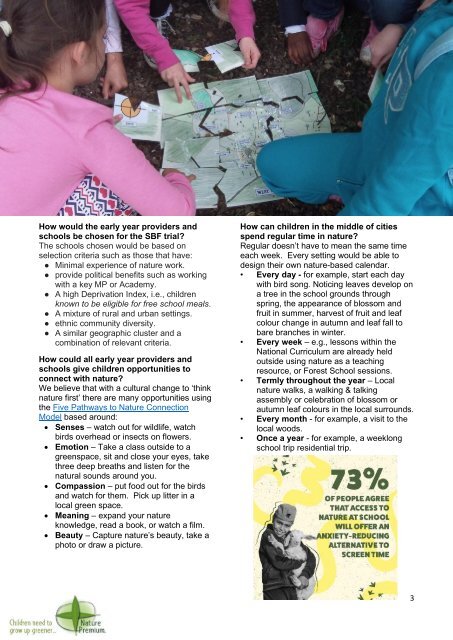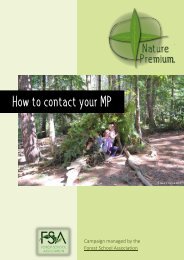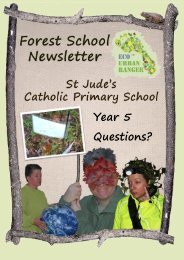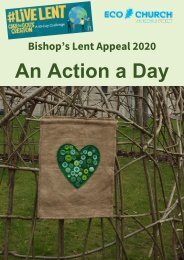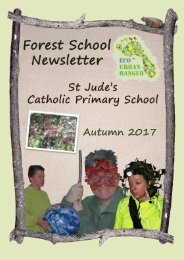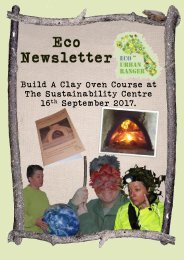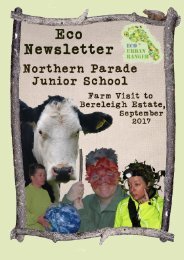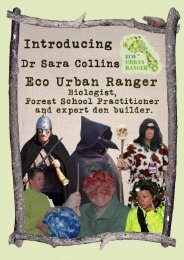Overview of the Nature Premium SBF Trial
The Nature Premium campaign is calling for the UK government to guarantee regular and ongoing nature experiences for all children and young people with additional funding for those that need it most.
The Nature Premium campaign is calling for the UK government to guarantee regular and ongoing nature experiences for all children and young people with additional funding for those that need it most.
Create successful ePaper yourself
Turn your PDF publications into a flip-book with our unique Google optimized e-Paper software.
How would <strong>the</strong> early year providers and<br />
schools be chosen for <strong>the</strong> <strong>SBF</strong> trial?<br />
The schools chosen would be based on<br />
selection criteria such as those that have:<br />
● Minimal experience <strong>of</strong> nature work.<br />
● provide political benefits such as working<br />
with a key MP or Academy.<br />
● A high Deprivation Index, i.e., children<br />
known to be eligible for free school meals.<br />
● A mixture <strong>of</strong> rural and urban settings.<br />
● ethnic community diversity.<br />
● A similar geographic cluster and a<br />
combination <strong>of</strong> relevant criteria.<br />
How could all early year providers and<br />
schools give children opportunities to<br />
connect with nature?<br />
We believe that with a cultural change to ‘think<br />
nature first’ <strong>the</strong>re are many opportunities using<br />
<strong>the</strong> Five Pathways to <strong>Nature</strong> Connection<br />
Model based around:<br />
• Senses – watch out for wildlife, watch<br />
birds overhead or insects on flowers.<br />
• Emotion – Take a class outside to a<br />
greenspace, sit and close your eyes, take<br />
three deep breaths and listen for <strong>the</strong><br />
natural sounds around you.<br />
• Compassion – put food out for <strong>the</strong> birds<br />
and watch for <strong>the</strong>m. Pick up litter in a<br />
local green space.<br />
• Meaning – expand your nature<br />
knowledge, read a book, or watch a film.<br />
• Beauty – Capture nature’s beauty, take a<br />
photo or draw a picture.<br />
How can children in <strong>the</strong> middle <strong>of</strong> cities<br />
spend regular time in nature?<br />
Regular doesn’t have to mean <strong>the</strong> same time<br />
each week. Every setting would be able to<br />
design <strong>the</strong>ir own nature-based calendar.<br />
• Every day - for example, start each day<br />
with bird song. Noticing leaves develop on<br />
a tree in <strong>the</strong> school grounds through<br />
spring, <strong>the</strong> appearance <strong>of</strong> blossom and<br />
fruit in summer, harvest <strong>of</strong> fruit and leaf<br />
colour change in autumn and leaf fall to<br />
bare branches in winter.<br />
• Every week – e.g., lessons within <strong>the</strong><br />
National Curriculum are already held<br />
outside using nature as a teaching<br />
resource, or Forest School sessions.<br />
• Termly throughout <strong>the</strong> year – Local<br />
nature walks, a walking & talking<br />
assembly or celebration <strong>of</strong> blossom or<br />
autumn leaf colours in <strong>the</strong> local surrounds.<br />
• Every month - for example, a visit to <strong>the</strong><br />
local woods.<br />
• Once a year - for example, a weeklong<br />
school trip residential trip.<br />
3


